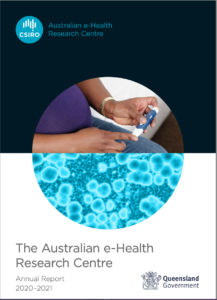AEHRC Annual Report 2020-21
CSIRO’s Australian e-Health Research Centre today publishes our annual report for 2020-21. The report provides an overview of the significant achievements of AEHRC in 20/21 including stand out initiatives such as tracking variants of the SARS-COV2 virus genome and developing COVID-19 analytics approaches for QLD Health. Our world leading FHIR terminology server, Ontoserver, has been licensed by the UK’s National Health Service for a national clinical terminology service, amongst other national and international licensing.
As Australia moved through the COVID-19 pandemic, the AEHRC was ideally positioned to play a national role as Australia increases the digitisation of healthcare and the pace of transformation.
The AEHRC has led a number of significant Virtual Care trials – including mobile health for women with gestational diabetes, patients undergoing total knee replacement, aged people living alone and many others. The results from these trials are showing the value of Virtual Care to the individual and to health services. AEHRC has continued to work with Australia’s health departments, peak bodies and health IT software vendors to agree on data standards to support the sharing of data using data standards – a vital component of safe and efficient Virtual Care interactions.
The world also continues to accelerate the use of new technologies to drive precision healthcare. This year our groups have continued to work with clinical research and clinical collaborators on a large number of trials and implementations of technology to support precision health approaches. Our contribution to these trials are across the program – including medical image analysis for Alzheimer’s disease and Cerebral Palsy and genomic sequence analysis for Motor Neurone Disease. Despite COVID-19 often pausing recruitment and monitoring of trials, our teams have worked with our collaborators to ensure that the trials can resume and continue when safe.
The AEHRC Annual Report is an opportunity for our five research groups to showcase the science they undertake, platform technologies they develop and collaborations they drive with health and industry partners. As always, the report includes many examples of the use of Artificial Intelligence and Machine Learning techniques to power high impact digital health solutions.
Finally, a big thank you to all of the staff and students of the AEHRC for another great year!
The Australian e-Health Research Centre (AEHRC) is CSIRO's digital health research program and a joint venture between CSIRO and the Queensland Government. The AEHRC works with state and federal health agencies, clinical research groups and health businesses around Australia.

